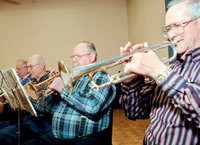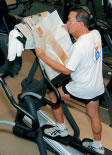 |
|||||||||||||||||

Texas Center for Music and Medicine Words of Wisdom |
The generation that added 78 million people to the world is reaching a major milestone this year as the first Baby Boomers turn 60. The "boom," which lasted 19 years, began in 1946 when 3.4 million Americans were born - up from 2.8 million the previous year and 2.4 million a decade earlier. Because of their large numbers, Baby Boomers are expected to have quite an impact on how the nation deals with issues of aging. In honor of their big 6-0, here are a few words of advice from UNT experts about how we can all feel younger longer. 1. Learn a new skill — playing a musical instrument works wonders. 
There’s nothing like learning a new skill to keep your brain limber, and Debbie Rohwer, chair of music education in the College of Music, has just the thing. As director of the Denton New Horizons Band, the first beginning band for senior citizens in Texas, Rohwer has seen the positive effects that learning to play an instrument can have on seniors — both those who hadn't played since high school and those who never played at all. “They become more active in the community, they go to concerts more, and they become energized,” Rohwer says. “I have heard from individuals that their breathing becomes better, their manual dexterity becomes better, they feel healthier and they feel more relaxed — everything that you would want to have happen to you in later years of life.” 2. Protect your hearing — and compensate with new technology. Kris Chesky, director of the Texas Center for Music and Medicine at UNT, says many people notice changes in their ability to hear when they reach their 40s and 50s. “I think the general pattern is that you become aware that your sensitivity isn’t what it used to be,” he says. The Baby Boomer generation, in particular, was the first to be exposed to technology such as earphones and amplifiers, which definitely changed what listeners experienced at concerts, Chesky says. The damage is irreversible, but people can protect their ears from further hearing loss. Chesky suggests turning down the volume of radios and limiting the time you’re exposed to loud sounds. Educate yourself, he says, and be aware of the potential risks. When you do find it necessary to compensate for hearing loss, you’ll discover technology is on your side in everything from amplifiers for televisions and phones to new wireless listening devices. Hearing aids, too, have come a long way over just the past decade, says Amyn Amlani, assistant professor of speech and hearing sciences. “The first fully digital hearing aids came out in 1996,” he says. “Audiologists can program and fine-tune these devices, increasing the audibility, comfort and sound quality for the listener.” Hearing aid systems now also feature less feedback and reduced noise. Today’s directional-microphone systems improve the ability to hear in background noise by about 3 to 4 decibels, Amlani says. 3. Work longer if you want to — and plan for life after work. 
In work situations where experience, judgment and wisdom are valued, older workers are an asset, says Bert Hayslip, Regents Professor of psychology, and many people may wish to or need to keep working past age 65. “Working for years for the same company and retiring to a life of leisure is passé,” Hayslip says. “Variety of activity is important to minimize cognitive loss as you age, and if you can still contribute to your workplace, you should be able to still work.” But he adds that the happiest retirees are those “who define themselves other than by their jobs” and who have planned for life after work. “Retirement, like anything else, should be something you put some thought into,” he says. By the way, Hayslip says it’s a myth that once you’ve lost an intellectual ability, you can never regain it. In one of his studies, volunteers with an average age of 70 used analogy, vocabulary and synonym tests to improve their problem solving and reasoning skills. Most had retained those skills when they were retested a month later. “There are a number of ways older people can stay mentally sharp, like spending less time watching TV and more time reading,” Hayslip says. “These strategies can start at any age.” 4. Above all, stay physically active — just 30 minutes of walking a day can help.
Some people think of “being active” as going to a gym all week for strenuous workouts. But Noreen Goggin, associate professor of kinesiology, health promotion and recreation, says walking for just 10 minutes three times a day, five days a week, may improve balance and posture and help prevent falls for older adults. She says it’s especially important for women, who are more likely than men to fall and break bones as a result of osteoporosis. “It is never too late to start being active,” Goggin says. “It’s even important for older adults who have arthritis because the exercise will reduce joint pain and strengthen their muscles.” Exercise can also increase flexibility and help lower the risk of developing illnesses such as diabetes or heart disease. James Swan, professor of applied gerontology, says in general being physically active tends to pay off in terms of less disability in advanced age. “I’ll note a quote from a local Texercise meeting (a statewide fitness campaign for older Texans): ‘If they could put exercise into a pill, it would be called a wonder drug,’” he says. Baby Boomers may be listening — Swan’s studies show that they engage in moderate physical activity more often than members of the Post-Boomer generation (those born from 1966 to 1975). Since Boomers don’t think of themselves as aging, Swan refers to their physical activity as “getting tougher for the fourth quarter” of life.
|
||||||||||||
